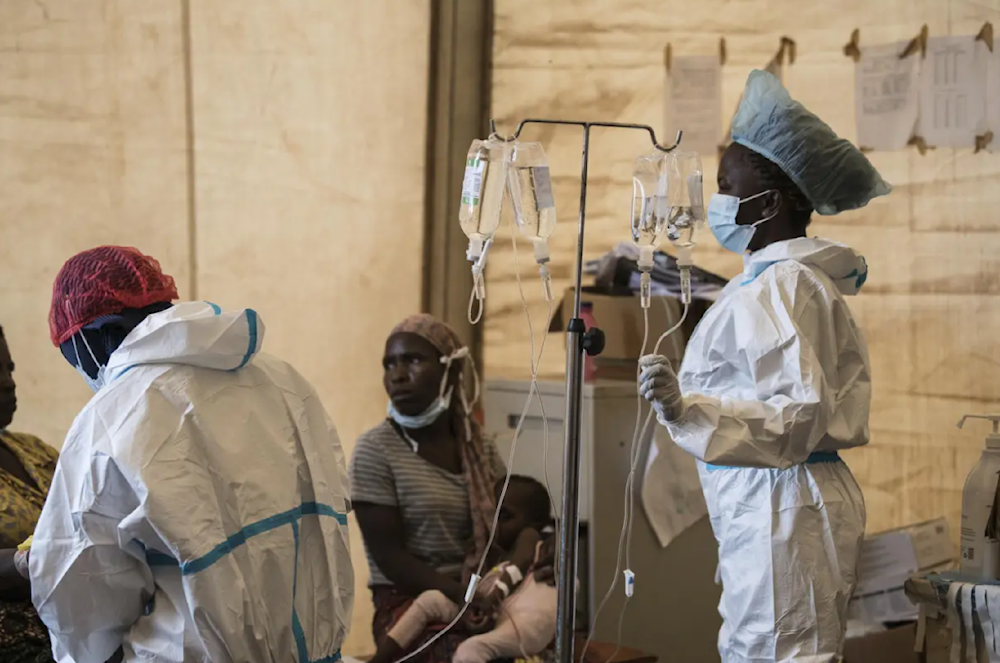Cholera outbreaks surge in Africa: WHO Africa
Cholera outbreaks are now occurring in several countries, the most notable of which being Zambia and Zimbabwe.
-

Health workers treat Cholera patients at the Bwaila Hospital in Lilongwe, central Malawi, on January 11, 2023. (AP)
More than 26,000 cases of cholera and 700 deaths were reported in 10 African nations in January, Fiona Braka, spokesperson for the World Health Organization (WHO) Regional Office for Africa, revealed on Tuesday.
"In the first four weeks this year, 10 countries in the WHO African region have reported over 26,000 cases and 700 deaths, which is almost twice the numbers reported during the same period in 2023," Braka explained in a press release, emphasizing that the risk of the disease spreading further remains high.
Cholera outbreaks are now occurring in several countries, the most notable of which are Zambia and Zimbabwe. Mozambique, Tanzania, the Democratic Republic of the Congo (DRC), Ethiopia, and Nigeria are also reporting "active outbreaks".
What is Cholera?
Cholera is a sudden-onset diarrheal infection caused by bacteria, usually transmitted through contaminated food or water. The condition is closely associated with impoverished conditions and a lack of access to clean drinking water.
Braka also warned that the risk of spreading is particularly high during the "peak transmission season," in addition to climate change and conflict exacerbating the risk of spreading the disease.
"Floods, cyclones, and droughts further reduce access to clean water and create an ideal environment for cholera to thrive," she detailed.
The WHO reports that a continued cholera outbreak in Africa has hit 17 nations in the last 2 years.
The DRC, Ethiopia, Malawi, Mozambique, and Nigeria accounted for 76.4% of the 303,121 cases reported between January 2022 and January 2024.
The World Health Organization (WHO) reported last year that while poverty and conflict continue to be the primary factors driving cholera, climate change has played a role in the disease's increased prevalence worldwide since 2021, as it has led to more frequent and intense storms.
In Zambia, heavy rains and sudden floods have transformed certain neighborhoods into waterlogged or soggy areas.
The Health Ministry said the country had received from the WHO around 1.4 million oral cholera vaccines, with 200,000 more expected to be delivered soon.
Zambia on alert as fatality rate hits 4%
Last month, a major cholera outbreak hitting Zambia since October prompted authorities to extend the schools' shutdown after the recent holidays and to mobilize the National Disaster Management Agency.
In early January, the Zambian government declared that schools, originally scheduled to commence the academic year on January 8, would now commence on January 29. Parents and students were encouraged to utilize educational programs broadcast on public television and radio, drawing parallels with the measures taken during the COVID-19 pandemic.
With 412 people dead and more than 10,413 infected cases recorded then, the government transformed a large soccer stadium in the capital into a treatment center and opened up a mass vaccination program. It also said it was providing 2.4 million liters of clean water per day nationwide.
Zambia has experienced numerous significant cholera outbreaks since the 1970s, but according to Dr. Mazyanga Mazaba, the Director of Public Health Policy and Communication at the Public Health Institute, the current outbreak is the most severe in the past two decades in terms of the number of cases.
According to the Zambian Public Health Institute, 229 infected individuals passed before being admitted for treatment.

 3 Min Read
3 Min Read








